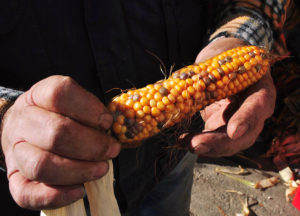On the last day of 2020, Mexican President Lopez Obrador pledged to phase out GMO corn imports and prohibit the use of glyphosate — the herbicide that commonly accompanies many GMO crops — by 2024. The decree was ambitious and controversial, and faced immediate pushback from U.S. trade representatives. Since the initial decree, Mexico has softened its stance, agreeing to GMO corn imports for animal feed and industrial uses but not for human consumption.
However, despite Mexico's concession, the dispute between the two countries continues. America is the birthplace of GMOs, including GMO corn. More than 92% of the corn grown in the States is GMO. Mexico is the birthplace of corn, and one of the United States' largest agricultural trading partners.
The U.S. alleges that GMO corn restrictions violate the United States-Mexico-Canada Agreement (USMCA), the trade agreement which replaced the North American Free Trade Agreement (NAFTA) in 2020. The combination of NAFTA and GMO corn devastated the livelihoods of Mexican corn farmers in the 1990s, setting the stage for the current dispute.
The trouble with NAFTA
Before NAFTA went into effect in 1994, Mexican farmers supplied most of the corn for domestic consumption. The government protected corn farmers by allowing foreign imports only if the domestic supply faced a shortfall.
NAFTA eliminated the Mexican government's protection mechanisms for Mexican farmers while preserving U.S. corn subsidies for American farmers. The results were devastating for Mexico. During NAFTA's first decade, cheap U.S. corn flooded the Mexican market, causing the price of domestically-grown corn to plummet. The economic devastation to Mexico's agricultural sector cannot be overstated, and contributed to a 75% increase in illegal immigration into the States.
During the same time period, genetically modified corn entered the market. As GMO corn was adopted by more U.S. farmers, it gained a foothold in shipments headed for Mexico.
GMO contamination in the homeland of maize
The cultivation of genetically modified corn for commercial purposes is already prohibited in Mexico. That means that it's illegal to grow GMO corn with the intention to sell it into the marketplace. While some GMO corn has been grown in test plots in Northern Mexico, agribusiness writer and researcher Tim Wise believes the test plots are not significant sources of contamination. "[It] isn’t pollen on the wind, it’s kernels of maize in people’s pockets.” Kernels that came across the border as imported grain.
Mexico imports an estimated 16 billion tons of U.S. corn each year. Most of that is genetically modified yellow corn used for livestock feed or industrial purposes. Mexican farmers grow white corn domestically for human consumption. However, corn is a very promiscuous crop, and different varieties of corn can cross-pollinate. The resulting GMO contamination of native corn varieties grown in Mexico is well-documented.
"The source of life"

The word "maize" is often used interchangeably with the word "corn." The term comes from the Indigenous word mahiz, meaning “source of life." The reverence of the crop's name underscores its importance to food security, political stability and cultural identity.
In the U.S., the National Corn Growers Association's director of public policy Angus R. Kelly objected to Mexico's initial decree, which he criticized as a rejection of biotech crop traits "without any scientific basis." Dismissing Indigenous rejection of unwanted technology as "unscientific" is a common racist dog whistle reflecting bigoted views. It's also simply not true. There is science supporting caution or outright rejection of GMOs, including significant work supplied by the Union of Concerned Scientists. (Since the initial decree, the U.S. has declined Mexico's proposal to undertake joint scientific research on GMO corn).
What threat does GMO contamination pose to native Mexican corn varieties? A report written by the Commission on Environmental Cooperation explored the issue in 2015:
"Impacts on the genetic diversity of Mexican maize could have direct repercussions on the diversity of maize and ecosystems in all of North America and the rest of the world. Mexico is one of the centers of origin for maize. To lose a variety of maize in Mexico is to lose it throughout the planet."
The report also notes that one trait of the contaminating pollen — the production of Bt insecticide — has had negative effects on non-target organisms in the United States.
The native species at risk of contamination carry invaluable genetic information and unique traits. Many can thrive in difficult growing conditions such as poor soil or mountainous land. Protecting native corn allows breeders to incorporate their traits into new varieties, creating plants that are crucial as we adapt to a changing climate.
The Non-GMO Project applauds Mexico's decision to restrict genetically modified corn imports, safeguarding native maize varieties from GMO contamination and preserving Mexico's cultural heritage. This bold action will help protect and build the non-GMO food supply while preserving Mexico's sovereignty and autonomy.
